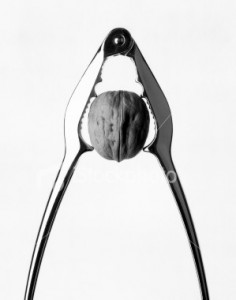Teeth grinding (medically called “bruxism”) can be a serious health issue. If you suffer from teeth grinding, the situation WILL get worse. By age 40 or 50, most bruxers have worn their teeth to the degree that extensive tooth restorations must be performed, such as bridges, crowns, root canals, implants, partial dentures, and even complete dentures. Because Dental Health is dedicated to helping you need as few restorations in your lifetime as possible, we take teeth grinding seriously!
There are many people who clench and grind and don’t know they are doing it, both during the day and at night. Teeth grinding in your sleep is often the bigger problem because it is harder to control. Grinding at night often  exerts remarkably powerful forces on teeth, gums, and joints. Estimates range from three to ten times more force than used when chewing. Ten times the force is enough to crack a walnut!
exerts remarkably powerful forces on teeth, gums, and joints. Estimates range from three to ten times more force than used when chewing. Ten times the force is enough to crack a walnut!
Why are these forces so high? Because when you are asleep, the grinding activity is not under control of the conscious, rational brain. In chewing, some of the force is applied to the food, not to the teeth. But if you grind your teeth at night, the entire force is applied directly to the teeth. Teeth grinding can be noisy enough at night to bother sleeping partners.
In its initial stages, because bruxism only involves minor symptoms and inconveniences, it’s often ignored by patients. At a certain point, however, the symptoms begin to noticeably affect your quality of life and you start to look for treatment.
As part of our strong preventive orientation at Dental Health, we discuss bruxism with all our patients. If it is left undiagnosed, we observe significant wear of the bite, cracks of the teeth, and complaints of jaw pain, headaches, temperature sensitivity and even loose teeth. Our goal is to help you become aware of bruxism and treat it before the habit is ingrained, which can bring about about irreversible losses. If left untreated, excessive grinding can cause significant harm to the teeth.
Symptoms of Bruxism:
- Pain and sensitivity of the teeth.
- Hot and cold sensitivity.
- Pain in the jaw, especially in the morning.
- Chipped or broken teeth.
- Headaches, neck pain, ear pain or muscle tension.
- Excessive wear on the occlusion surface of the teeth.
- Loose teeth.
Researchers have not been able to pinpoint the exact cause, but many specialists agree that stress and anxiety play a major role. Treatment typically focuses on reliving acute symptoms and limiting permanent damage to teeth.
Teeth grinding can be helped through biofeedback, visual imagery or other stress reduction techniques. Your Dental Health dentist also can make minor adjustments on the teeth to make them fit better.
A Nightguard Should be Worn By Anyone Who Grinds Their Teeth
We may also suggest a nightguard to prevent damage to the teeth. The appliance is custom made to your bite for proper fit and comfort. Over-the-counter appliances are not recommended because of the ill-fit and possible dislodging of the appliance during the grinding.
Many people think nightguards are all the same and picture a nightguard that is the shape and size of an athlete’s mouth piece. At Dental Health, we will work with you to make sure you get a nightguard that works for you. There are many different types. Some fit over the top teeth, some on the bottom. They may be designed to keep your jaw in a more relaxed position or provide some other function. If one type doesn’t work, another may.
For many people, a small nightguard called the NTI-tss. In one office visit we can create a custom-made NTI device. The tiny, clear plastic device fits over your top two front teeth. You only wear the device while you sleep at night. It makes clenching virtually impossible because there is no surface for your back teeth to bite down on, or bite into.
If we find that there is no nightguard that works for you, an orthodontic adjustment of the bite pattern may help some people. Surgery should be considered a last resort.
Teeth Grinding should be taken seriously. In today’s stressful age, it is almost epidemic. Please contact your Dental Health dentist if you believe you are clenching or grinding your teeth. This is one area where an ounce of prevention is worth a TON of cure!